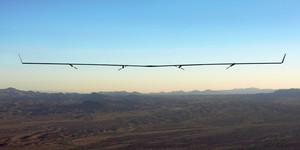
Advertising giant Google is claimed to be spending more than $1 billion (around £597 million) on a fleet of orbital satellites designed to provide internet access to those currently bereft.
According to details obtained by the Wall Street Journal, Google plans to spend between $1 billion and $3 billion in order to build a series of low-Earth-orbit (LEO) satellites which would provide wireless internet connectivity to areas of the world which are currently under-served by traditional methods of connectivity. The move is claimed to be a progression from Project Loon, a lower-cost endeavour in which Google has deployed balloons equipped with mesh networking capabilities to provide expanded internet coverage in selected areas.
The anonymous sources speaking to the paper claimed that the project will begin with 180 micro-satellites orbiting at lower-than-usual altitudes, each capable of providing connectivity to a surprising quantity of users. The project is claimed to be led by Greg Wyler, founder of satellite communications company O3b Networks in which Google was an early investor. Wyler recently joined Google as a full-time employee, alongside the former chief technology officer of the company.
'Internet connectivity significantly improves people's lives,' a Google spokesperson told the paper when the company was contacted for comment, 'yet two-thirds of the world have no access at all.' While that was clear indication that the company, which makes the vast majority of its revenue by serving adverts and collating user data for use by advertisers, is investigating potential solutions it's far from confirmation that a wide-area satellite internet network is close to launch.
According to details obtained by the Wall Street Journal, Google plans to spend between $1 billion and $3 billion in order to build a series of low-Earth-orbit (LEO) satellites which would provide wireless internet connectivity to areas of the world which are currently under-served by traditional methods of connectivity. The move is claimed to be a progression from Project Loon, a lower-cost endeavour in which Google has deployed balloons equipped with mesh networking capabilities to provide expanded internet coverage in selected areas.
The anonymous sources speaking to the paper claimed that the project will begin with 180 micro-satellites orbiting at lower-than-usual altitudes, each capable of providing connectivity to a surprising quantity of users. The project is claimed to be led by Greg Wyler, founder of satellite communications company O3b Networks in which Google was an early investor. Wyler recently joined Google as a full-time employee, alongside the former chief technology officer of the company.
'Internet connectivity significantly improves people's lives,' a Google spokesperson told the paper when the company was contacted for comment, 'yet two-thirds of the world have no access at all.' While that was clear indication that the company, which makes the vast majority of its revenue by serving adverts and collating user data for use by advertisers, is investigating potential solutions it's far from confirmation that a wide-area satellite internet network is close to launch.

MSI MPG Velox 100R Chassis Review
October 14 2021 | 15:04








Want to comment? Please log in.